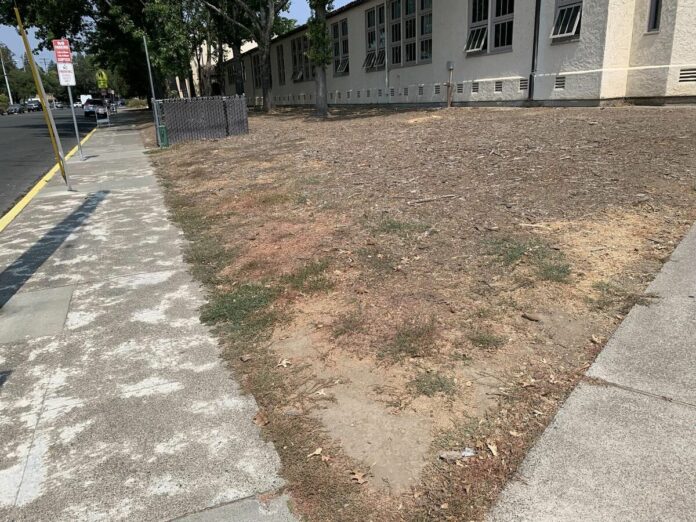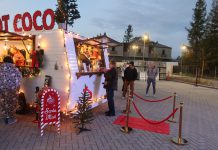
As the severe drought continues along the Russian River watershed, the Healdsburg Unified School District (HUSD) is doing a number of things, such as irrigating with recycled water, to help conserve water.
At the most recent HUSD School Board meeting on Aug. 18, district superintendent Chris Vanden Heuvel provided a report to the board regarding steps the district is taking to reduce its water usage and conserve.
Residential water use accounts for 72% of the city’s water demand, whereas the HUSD and schools accounts for only 2% of the city’s water demand, according to city water usage data.
While schools only account for 2% of overall demand, the HUSD is taking various water conservation efforts.
Hand watering landscaping with recycled water
Vanden Heuvel said the district is hand-watering most of its landscape with recycled water.
“We actually send someone out to the water recycling center on Foreman Lane to pick up the water and come in two to three days a week watering our plants. We have a 350-gallon tank that we purchased and then we have a trailer we just finally got,” Vanden Heuvel said.
Additionally, the district recently purchased a 3,000-gallon tank that will live at the high school and will be used to irrigate the campus’ landscaping.
“We’re going to get the water tank and a booster pump and we will be able to irrigate the high school’s landscaping. There are all kinds of trees that are relatively new and lots of money has gone into and we want to be able to plug right into the drip system and use recycled water. The city has already agreed to deliver water to us so that we can get it into that tank,” Vanden Heuvel said.
He said their focus is to keep plants alive, especially the turf.
“We have new plantings at the district office. We have new plantings, bushes and trees, around the brand new gym. At the junior high we also have new plantings, so we’re desperately trying to keep the new landscaping that money has gone into,” he said.
Vanden Heuvel reiterated that they are using all recycled water.
Use of potable water to water only a few key fields
The brand new fields at Healdsburg High School are relatively green and are being kept alive. Vanden Heuvel said he can understand why this may seem like a controversial topic since so many homeowners are sacrificing their lawns and letting them go brown.
As the city did with determining which parks they would continue to irrigate with potable water, the district worked with the city to figure out which fields they could continue to water.
For “Healdsburg Elementary School (HES) and the high school, both with agreement from city council specifically, we have been able to use potable water to water those fields,” Vanden Heuvel said. “The reasoning behind that is our schools and parks for the community. The city was strategic in which areas it was going to dedicate water and they were crunching numbers and making sure that enough water was being conserved and that we could still water these areas so that at the end of this pandemic, the community could still have some opportunities for recreation. Imagine, after 18 months of being locked up, the kids can’t play soccer and they can’t play their sports.”
With this understanding, the district will use the HES and high school fields and synthetic turf to accommodate, as much as possible, recreational activities for residents and community members.
While a select few of the fields are being irrigated, others are being left to go brown. The field at Healdsburg Elementary School Fitch Mountain Campus isn’t being watered and Vanden Heuvel said they’ll have to replace it one day.
For the junior high, the district hopes to put in artificial turf later this fall. As a result, the junior high field is not being watered.
Vanden Heuvel said both the district and the city are concerned about tree health.
He said there are some trees, like the ones along HES that line North Street, whose roots have gone really deep and are thriving, while other trees with shallow root systems aren’t thriving since they’ve become more dependent on watering.
“We’re going to have arborists coming to the district to confirm what we need to do. Do we need to trim, cut limbs or take down some trees? There is just no way to keep everything alive in these drought conditions,” he said, adding that there is a strong likelihood that many trees will not be salvageable post drought.
Looking at the feasibility of more storage tanks and well drilling
As the drought continues for the foreseeable future, Vanden Heuvel said the district is currently looking at the feasibility of either getting larger recycled water storage tanks or drilling a well at the high school.
“We’ve looked at the possibility of ordering three 10,000-gallon tanks to water natural turf at Healdsburg High. We would then be able to have recycled water delivered to those tanks and use that recycled water to water. The amount of money and time it would take just to move the water there is probably something that is not sustainable. Then we looked at the possibility of drilling our own well,” Vanden Heuvel said.
He said they’d try to find some water on the high school campus that they could tap into and drill a well, about a $150,000 cost.
“The best possibility, in my opinion, is for the city to take action and create a recycled water infrastructure that’s been missing for so long. I know there is talk about that at the city council. We have at the high school and the junior high school, irrigation lines ready for purple pipes if that eventually occurs,” Vanden Heuvel said.
School board vice president Mike Potmesil asked how expensive it would be to utilize the purple pipe system.
Vanden Heuvel expressed they’re still looking into it and will likely bring a report back to the board.
“The reality is, you cannot have recycled water coming into any potable water. We would have to separate out any irrigation from the main system and so it would be a matter of installing completely new irrigation systems. When we redo the field at Fitch that is going to be a big part of it and we’ll have to come up with a plan for HES,” Vanden Heuvel said.
According to Vanden Heuvel’s data, prior to kids coming back to school, the district’s water reduction efforts reflect a 33% reduction from July.
The drought certainly isn’t a stranger to Vanden Heuvel. He said he has a well on his property at the confluence of Felta and Dry Creek and he received a curtailment notice last week.
“We’re all dealing with this in different ways and like I said, we are trying to do our part responsibly, cutting water where we can and working with the city to make sure that we are providing opportunities for our kids,” he said.








